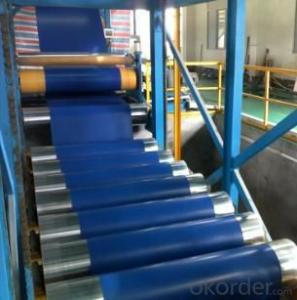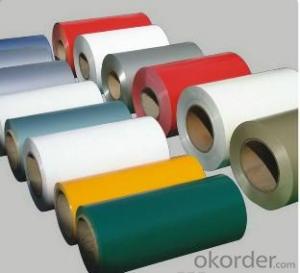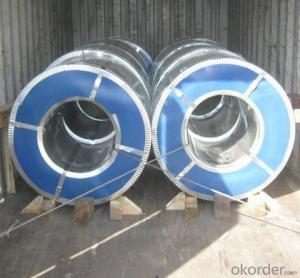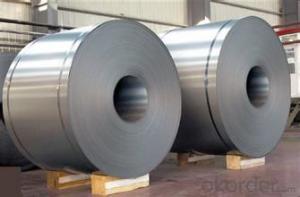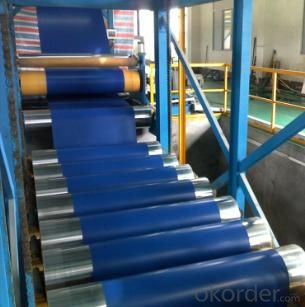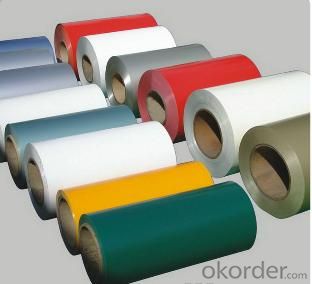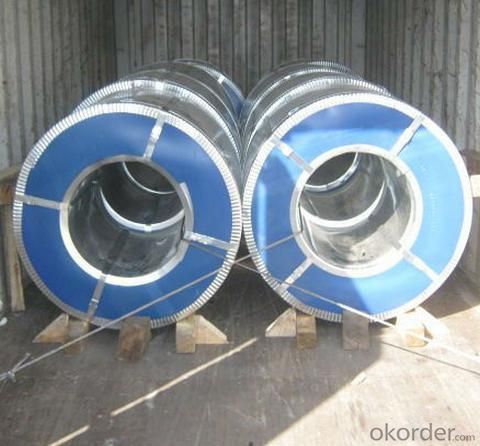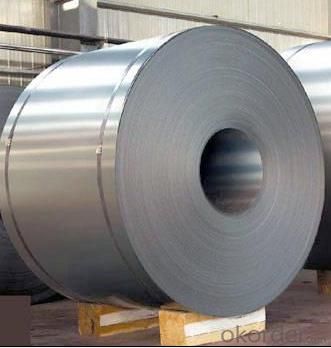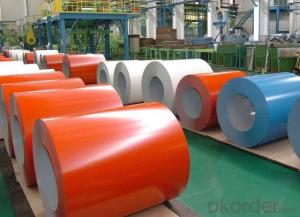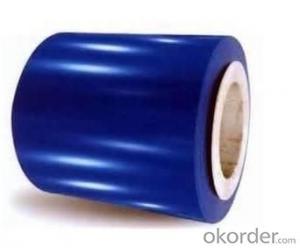Colored Coated Galvalume Steel Coils for Constructions
- Loading Port:
- Shanghai
- Payment Terms:
- TT OR LC
- Min Order Qty:
- 25 m.t.
- Supply Capability:
- 10000 m.t./month
OKorder Service Pledge
OKorder Financial Service
You Might Also Like
| Standard: | AISI,ASTM,GB,JIS | Grade: | CGCC CGCH | Thickness: | 0.17-0.6mm |
| Place of Origin: | China (Mainland) | Brand Name: | Model Number: | GL-001 | |
| Type: | Steel Coil | Technique: | Cold Rolled | Surface Treatment: | Coated |
| Application: | Container Plate | Special Use: | High-strength Steel Plate | Width: | 750-1250mm |
| Length: | C | certificate: | SGS,BV,ISO | usage: | building roofing material |
| coil weight: | 3-7 ton | coil ID: | 508mm | base metal: | hot rolled steel coil |
Packaging & Delivery
| Packaging Detail: | mills standard export seaworthy packing or according to the customers' requirements |
| Delivery Detail: | 30days |
Galvalume Steel Coils/Coil
Product advantages:
A.high strength
B.strong soundess
C.well rainproof performance
D.continuous rolling
E.good corrosion resistance
F.easy to install and remove
Quality guarantee:
our company attaches importance to quality management and assurance,it is equipped with sound testing means and has passed the certification of ISO9001 Quality Management System and SGS,BV verification
Deiverse products
With world high-quality galvanized,aluminum and zinc coated and cold-rolled steel coils as base materials.
- Q: What are the challenges in coil blanking?
- Coil blanking, a process used to cut flat metal sheets from coiled stock, presents several challenges that need to be addressed for efficient and accurate production. Some of the key challenges in coil blanking include: 1. Material variations: Coiled stock can have variations in thickness, width, and surface quality. These variations can affect the cutting process and result in inconsistent blanks. Proper material selection and control are crucial to ensure consistent quality and dimensional accuracy. 2. Coil set and crossbow: Coiled stock often has inherent shape imperfections like coil set (longitudinal curvature) and crossbow (transverse curvature). These imperfections can cause alignment issues during the cutting process, leading to misalignment and inaccurate blanks. Specialized equipment and techniques, such as straighteners and leveling systems, are required to minimize these shape imperfections. 3. Coil edge condition: The edges of coiled stock can have burrs, waves, or irregularities, which can affect the quality and precision of the cut blanks. Adequate edge conditioning techniques, such as deburring or edge trimming, need to be employed to ensure clean and straight edges for the final blanks. 4. Slitting and shearing forces: The forces exerted during the coil blanking process can induce stresses and strains in the material, potentially leading to deformation or springback. These factors can result in dimensional variations and affect the overall quality of the finished blanks. Careful consideration of the slitting and shearing forces, along with proper tooling design and machine settings, is necessary to minimize these effects. 5. Scrap and material waste: Coil blanking can generate significant amounts of scrap material, especially during setup and adjustment phases. Managing scrap and minimizing material waste are critical challenges in coil blanking to optimize production efficiency and reduce costs. Efficient nesting algorithms and real-time monitoring systems can help optimize material utilization and minimize waste. 6. Automation and productivity: Coil blanking processes often require high-speed and high-volume production to meet market demands. Implementing automation systems, such as robotic material handling and advanced control systems, can enhance productivity. However, integrating and synchronizing these automation components with the cutting process can be challenging and requires careful planning and system integration expertise. Overall, addressing these challenges in coil blanking requires a combination of proper material selection, advanced equipment, specialized techniques, and efficient process control. By overcoming these challenges, manufacturers can achieve consistent quality, dimensional accuracy, and productivity in coil blanking operations.
- Q: How are steel coils used in the production of storage containers?
- In the production of storage containers, steel coils play a vital role. These coils, manufactured from high-quality steel, are crucial for constructing the walls, floors, and roofs of the containers. To begin the process, the steel coil is uncoiled and passed through a series of machines that cut and shape it into the desired dimensions. Then, the steel is transformed into panels, which are either welded or riveted together to form the container's structure. The strength, durability, and resistance to corrosion make steel coils an excellent material for storage containers. They provide a robust framework that can endure heavy loads and harsh environmental conditions. Moreover, the coils can be easily molded and customized to meet specific size and shape requirements. Once the structure of the container is complete, it is typically coated with a protective layer of paint or other coatings to further enhance its durability and resistance against weather elements. This ensures that the container remains unaffected by moisture, UV rays, and other external factors that could cause deterioration. All in all, steel coils are of utmost importance in the production of storage containers as they offer the necessary strength and durability required to safely store and transport a wide array of goods and materials.
- Q: How are steel coils inspected for quality control?
- Steel coils are inspected for quality control through a series of rigorous tests and inspections. This typically involves visual checks for any surface defects, such as scratches or dents, as well as measurements of dimensions, weight, and thickness. Additionally, non-destructive testing techniques like ultrasonic or magnetic particle testing may be conducted to detect internal flaws or inconsistencies in the steel. These comprehensive inspections ensure that only high-quality steel coils are approved for use.
- Q: How are steel coils packaged for shipment?
- Steel coils are typically packaged for shipment by being tightly wrapped in protective materials such as plastic or steel strapping. They are then secured onto pallets or placed into steel crates, ensuring stability during transportation. The packaging helps to prevent damage, corrosion, and movement during handling and transit.
- Q: Also, what is the top best slow cooker that is 100% stainless steel? Thank you!
- My SS pans are Prestige.
- Q: I am doing a experiment on mild steel soaked in sodium chlorideanyone can enlighten me about the effect of the sodium chloride in engineering term ?The mild steel specimen which I soaked in the sodium chloride has orange rust on it
- The mild steel contains a lot of Iron. The NaCl solution quickly attacks the iron content and forms rust. Over time, the solution may also cause what is called 'Chloride Cracking' of the steel. Pitting corrosion of stainless steel due to chlorides would certainly produce a rust-colored product. Passivation can be used to maintain a good corrosion resistant surface of stainless steel process vessel. There are many commercial products for this purpose. In the pharmaceutical industry, this process is often called derouging, that is to remove the buildup of iron oxides on the stainless steel process surfaces
- Q: What are the common methods of inspecting steel coils for defects?
- There are several common methods used for inspecting steel coils for defects. These methods include visual inspection, ultrasonic testing, magnetic particle inspection, and eddy current testing. Visual inspection is the most basic method and involves physically examining the surface of the steel coil for any visible defects such as cracks, dents, or surface irregularities. This method is usually the first step in the inspection process and can quickly identify any obvious defects. Ultrasonic testing is a more advanced method that uses high-frequency sound waves to detect defects within the steel coil. A probe is used to transmit ultrasonic waves into the coil, and any internal flaws or defects will reflect the sound waves back to the probe. This method is effective for detecting defects such as voids, cracks, or inclusions within the material. Magnetic particle inspection is another commonly used method for inspecting steel coils. This technique involves magnetizing the coil and then applying iron particles to the surface. Any defects or cracks will cause a disturbance in the magnetic field, attracting the iron particles and making them visible. This method is particularly effective for detecting surface cracks or defects. Eddy current testing is a non-destructive method that uses electromagnetic induction to detect defects in the steel coil. A probe is used to generate an alternating magnetic field, and any changes in the electrical conductivity or magnetic permeability of the material due to defects will produce eddy currents. These eddy currents can be measured and analyzed to identify defects such as cracks, voids, or changes in material properties. Overall, these common methods of inspecting steel coils for defects provide various levels of accuracy and sensitivity, allowing for thorough inspections to ensure the quality and integrity of the steel coils. The choice of method depends on factors such as the type and size of defects to be detected, the required level of inspection accuracy, and the cost and time constraints of the inspection process.
- Q: I want to purchase a set of knives made of carbon steel and want to be able to store them on a magnetic knife strip for handy access, I just wasn't sure if this alloy would stick to a magnet????Thanks
- Yes, carbon steels are magnetic. In fact, some stainless steel knives are magnetic as well. Some stainless steel alloys are naturally magnetic and some become magnetic when they are deformed by forging or rolling (check out a deep drawn SS sink and explore where it is magnetic and where it isn't). Depending on the details, some carbon steels can be made harder than the stainless steel typically used for knives (440 alloy) but the carbon steel knives are very much more likely to suffer corrosion. hope this helps
- Q: I would like to build steel galvanization plant.
- How big of a kettle do you want to go with? A small 6-10 foot kettle would work fine for spinner work (small parts ran in baskets) but if you want to handle large beams and so forth you will need to have at least a 25 foot or longer kettle. You will need tanks for caustic,acid,rinsing,and preflux solutions. If you go with sulfuric acid it will have to be heated. The caustic and flux tanks need to be heated in any case.You will also need a bag house to control smoke coming off the kettle. First you should look into permits such to see if you can actually build this plant. Galvanizing is nasty work and the laws and regs are strict. Former Kettleman
- Q: What are the different types of steel coil packaging methods?
- There are several types of steel coil packaging methods, including shrink wrapping, strapping, wooden crates, and steel or plastic bands.
Send your message to us
Colored Coated Galvalume Steel Coils for Constructions
- Loading Port:
- Shanghai
- Payment Terms:
- TT OR LC
- Min Order Qty:
- 25 m.t.
- Supply Capability:
- 10000 m.t./month
OKorder Service Pledge
OKorder Financial Service
Similar products
Hot products
Hot Searches
Related keywords
